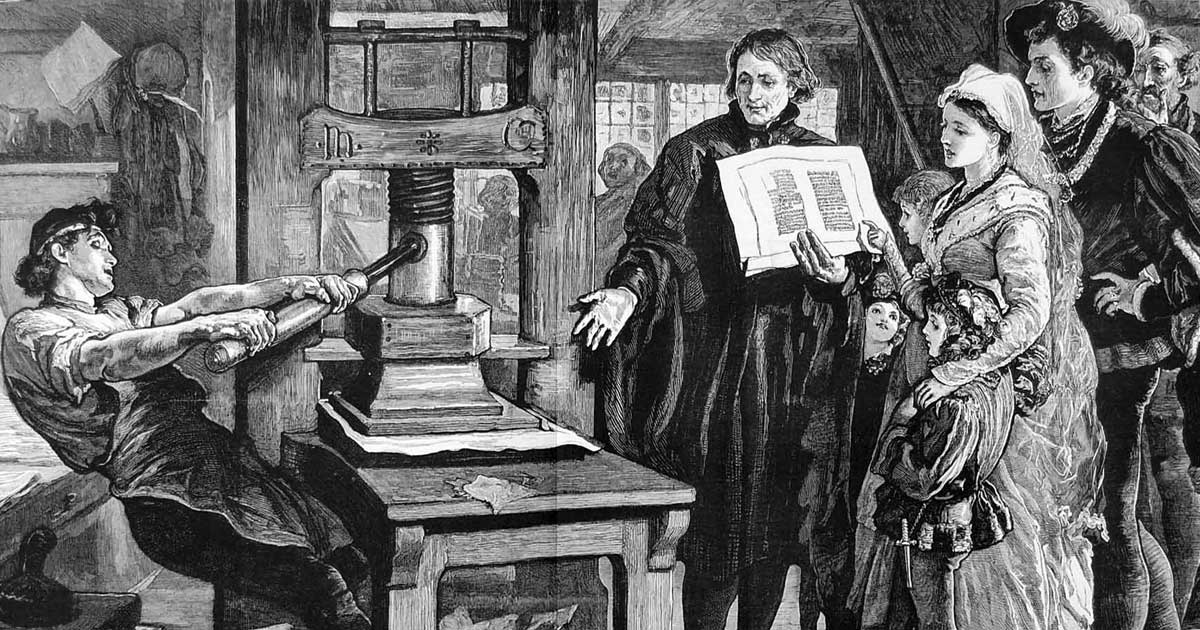The Printing Press Changed the World fact

The Printing Revolution – the Catalyst of the Renaissance, Scientific Revolution, Enlightenment, and the Modern Age
The printing press (invented by Johannes Gutenberg in 1440) changed the world during the Renaissance, and ushered in the Scientific Revolution, Enlightenment, and Modern Age.
Before the Printing Press Barons, Kings, and Churches ruled Europe, and the average citizen had little in the way of rights or education. The average person was sometimes able to read and write before the printing press. It is a myth they couldn’t read; it was common to have written words scrawled on walls, paper, and even dirt before the press. The skill of writing was less common[1]) The printing press almost immediately changed culture, science, and politics. For the first time, many people had access to not only Plato, Aristotle, and Ptolemy, but access to Copernicus and the other early great thinkers of the of the Renaissance. There was also access to mass-produced single page pamphlets. The proliferation of pamphlets changed politics and religion, quickly spreading new ideologies. For example, Martin Luther’s “95 Theses” which began the Protestant Reformation was one such pamphlet.[2][3][4]
Galileo had remarked around the 1630’s (paraphrasing) that, “when he was young one could read everything there was to know, but by the time of his quote, one could no longer know everything there was to know, as new books were being written faster than one could read.”
Whether we look to Copernicus’s On the Revolutions of the Heavenly Sphere 1543, John Locke’s Second Treaty of Government 1680 – 1690, Galileo’s Dialogue Concerning the Two Chief World Systems 1632, or perhaps Thomas Paine’s Common Sense (pamphlet) 1776, we can see how the printing press changed how people thought about the world. Later we can see much the same thing with specific works such as Paine’s the Rights of Man 1792.
Once people read the classics for themselves, things would never be the same. No longer was it just scribes in the church who wrote books, but quickly artisans and commoners could become scholars. From here forward, information was democratized. Soon after the creation of the printing press, we get the first modern universities, although it wouldn’t be until 1800 when non-religious education took root.
Despite advances in technology Gutenberg’s press remained mostly unchanged until the 19th-century and the advent of the mechanized press.[5][6]
Johannes Gutenberg and the Printing Press. As noted above, it is a myth that the average person couldn’t read before the printing press; it was less common to be well read, but people could read basic words. Books, not words, were uncommon.FACT: The printing press was invented in the Holy Roman Empire by the German Johannes Gutenberg around 1440, based on existing screw presses, which were invented in 1 AD as pressed for olives and such. The concept of movable type was not new in the 15th century either. Movable type printing had been invented in China during the Song dynasty. It was later used in Korea during the Goryeo Dynasty, where metal movable-type printing technology was developed in 1234. Despite these Eastern inventions, the Gutenberg press changed Europe. The printing press spread within several decades to over two hundred cities in a dozen European countries. By 1500, printing presses in operation throughout Western Europe had already produced more than twenty million volumes. In the 16th century, with presses spreading further afield, their output rose tenfold to an estimated 150 to 200 million copies. The operation of a press became so synonymous with the enterprise of printing that it lent its name to an entirely new branch of media, the press. Read more at Wikipedia.[7]
FACT: Johannes Gutenberg’s moveable type press marked the beginning of the Printing Revolution, a colossal moment in the history of information and learning. With access to printing presses, scientists, philosophers, politicians, and religious officials could replicate their ideas quickly and make them available to large audiences. Learn more about The Gutenberg Press.
TIP: The Printing Revolution ushered in the age of science and reason, today the internet and computers have the same effect, as did TV and radio before them. Liberty may be considered an inalienable right, but the reason you know this can be traced directly back to the printing press and authors like Mr. Locke. See the birth of liberalism.
The Renaissance: Was it a Thing? – Crash Course World History #22
Dinosaur Did not vote.
Yessir
Terry Heriot Did not vote.
I do believe the Gutenberg press changed the world.
Felipe Martins Supports this as a Fact.
It allowed more books to be made
Bob Supports this as a Fact.
Me to
Shahid Hussain Raja Supports this as a Fact.
Everyone has his/her own way of dividing history into phases. For this presentation, I take five inventions which changed the course of history. These are namely fire (35,000 BCE to 10,000 BCE), wheel (10,000 BCE to 1500 CE, printing press 1500 CE to 1750 CE), steam (1750 CE to 1945 CE) and internet (1945 CE to Present)- each being driver of that age as well as representing its essence. Next phase of history would start when Artificial Intelligence is as common as internet is today.
Invetion of printing press was the precursor of Enlightenment/Reformation as well as of Industrial Revolution and its cosequence, the Colonialism. It played major role in ending monarchy and ushered in the era of nation-state,democracy and nationalism.
Brandon Supports this as a Fact.
I personally think that the printing press is still changing the world
Thomas DeMicheleThe Author Did not vote.
That is well said.
internet mob Did not vote.
isn’t it ironic that Thomas is using a website to talk about how the printing press is changing the world?
Thomas DeMicheleThe Author Did not vote.
Only to the degree that you don’t see the printing press as a predecessor to the WordPress.